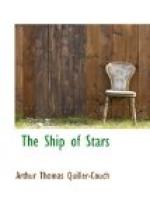Men told for years after how the old Squire came galloping up the drive that night, hoof to belly, his chin almost on mare Nonsuch’s neck, his face like a man’s who hears hell cracking behind him, and of the three dusky hounds which followed (the tale said) with clapping jaws and eyes like coach-lamps.
Down in the quiet church Taffy heard the outcry, and, laying down his plane, looked up and saw that his father had heard it too. Mr. Raymond’s mild eyes, shining through his spectacles, asked as plainly as words: “What was that?”
“Listen!”
For a minute—two minutes—they heard nothing more. Then out of the silence broke a rapid, muffled beat of hoofs, and Mr. Raymond clutched Taffy’s arm as a yell—a cry not human, or if human, insane—ripped the night as you might rip linen, and fetched them to their feet. Taffy gained the porch first; and just at that moment a black shadow heaved itself on the churchyard wall and came hurling over with a thud—a clatter of dropping stones—then a groan.
Before they could grasp what was happening the old Squire had extricated himself from the fallen mare, and came staggering across the graves.
“Hide me!—”
He came with both arms outstretched, his face turned sideways. Behind him, from the far side of the wall, came sounds—horrible shuffling sounds—and in the dusk they saw the head of one of the hounds above the coping and his forepaws clinging as he strained to heave himself over.
“Off! Keep ’en off!”
They caught him by both hands, dragged him within, and slammed the door.
“Hide me! Hi—!”
The word ended with a thud as he pitched headlong on the slate pavement. Through the barred door the scream of the mare Nonesuch answered it.
CHAPTER XVIII.
THE BARRIERS FALL.
There were marks of teeth on his right boot, but no marks at all on his body. Fright—or fright following on that evening’s frenzy—had killed him.
He was buried three days later, and Mr. Raymond read the service. No rain had fallen, and the blood of the three hounds still stained the gravel dividing the grave from the porch, where the crowd had shot them down.
For a while his death made small difference to the family at the Parsonage. They had fought his enmity and proved it not formidable for brave hearts. But they had scarcely realised their success, and wondered why his death did not affect them more.
About this time Taffy began to carry out a scheme which he and his father had often discussed, but hitherto had found no leisure for— the setting up of wooden crosses on the graves of the drowned sailormen. They had wished for slate, but good slate was expensive and hard to come by, and Taffy had no skill in stone-cutting. Since wood it must be, he resolved to put his best work into it. The names, etc., should be engraved, not painted merely. Some of the pew-fronts in the church had panels elaborately carved in flat and shallow relief—fine Jacobean designs, all of them. He took careful rubbings of their traceries, and set to work to copy them on the face of his crosses.




